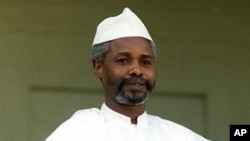The U.N. Committee Against Torture is calling for Senegal to either prosecute former Chad president Hissene Habre for crimes against humanity or extradite him to a country that will. Habre has been under house arrest in Dakar since 2000.
In 2006, the African Union called for Senegal to try Hissene Habre in the name of Africa. Senegal adopted laws that would allow it to do so, but the case continued to stall over funding.
That looked to be changing in November, when international donors meeting in Dakar pledged to fund an $11.7-million trial budget presented by the African Union and the European Union. The Senegalese government, which had originally asked for $36 million, said it would proceed with the trial as soon as it received all the funding.
It was therefore a surprise in December when Senegalese president Abdoulaye Wade told French broadcasters that he wanted to return the case to the African Union. Mr. Wade reaffirmed this decision to his Council of Ministers in a January 13 Cabinet meeting.
Mr. Wade's announcement stemmed from a November ruling by the court of West African regional bloc, ECOWAS, that Senegal alone cannot try Habre, but must instead try him in front of a special tribunal. In 2008, Habre had asked the ECOWAS court to block his trial in Senegal, citing violations of his rights.
In a letter dated January 12, the U.N. Committee Against Torture reminded Senegal of its "obligation" under the U.N. Convention against Torture to either prosecute Habre or extradite him to Belgium, or another country that will try him.
Legal counsel Reed Brody is with Human Rights Watch in Belgium, which issued an international arrest warrant for Habre in 2005.
"It is not an African Union case. Habre is in Senegal. Senegal failed to prosecute in 2000 and 2001. It refused to extradite him to Belgium in 2005. It has got to do one or the other," said Brody.
In December, Mr. Wade told French media he planned to, in his words, "get rid of Habre." The president did not say where he planned to send Habre, but said he no longer excluded Belgium as an option, albeit less than ideal.
The former Chadian leader fled to Senegal after being deposed in 1990. He has since been accused of crimes against humanity and thousands of political killings and cases of torture during his eight years in power. He has been under house arrest in Dakar since 2000.
Human rights activists, like HRW's Brody, say a trial in Senegal would set a landmark legal precedent of African courts judging African rulers on the continent, but the priority now is to get the trial underway.
"Belgium has already put together an indictment. Belgium, we believe, would be ready to give Hissene Habre a fair trial. We have always wanted the trial to be in Africa. We think it would have greater symbolic value if it were in Africa, but I have to say that after twenty years the victims would be happy to see a fair trial for Hissene Habre anywhere," said Brody.
A Senegalese presidential spokesman was not immediately available for comment on the issue.
The African Union is scheduled to discuss the Habre case at its summit in Addis Ababa in Ethiopia at the end of this month.
UN Committee Against Torture Calls for Prosecution of Former Chad President




